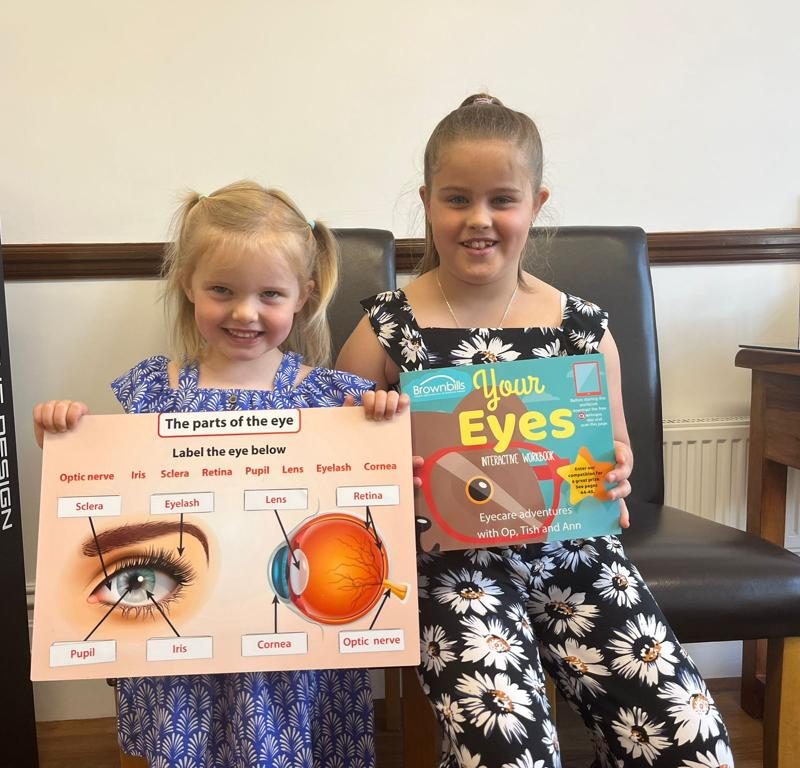
Although serious visual problems during childhood are rare, it’s important to have your children’s eyes tested regularly
1 in 5 school-age children have some form of undetected vision problem, which in turn often affects their learning, school performance and social life. Regular eye examinations with an Optometrist will help to detect these problems and ensure normal visual development.
Children’s eye examinations are particularly important too if there is a family history of childhood eye problems, such as squint or lazy eye in your family. All our Optometrists are experienced with examining children, and you can book to see Dr Pinney, AJ or Michelle.
What can I expect from a child’s eye examination?
You can expect our Optometrist to do a thorough evaluation of your child’s vision and eye health during their appointment. They will begin the appointment by asking about your child’s medical history including any family history of eye problems, previous eye-related issues, and any current concerns or symptoms your child may be experiencing, such as blurry vision, eye discomfort, or headaches.
Following this, they will move on to testing your child’s visual acuity by asking them to read letters or describe symbols from a chart at a distance. This helps determine how well they can see at various distances. To determine if your child needs glasses or contact lenses, the optometrist may use a phoropter or other tools to assess the refractive error, such as nearsightedness, farsightedness, or astigmatism.
We will also assess how well your child’s eyes work together and check for any issues with eye alignment (strabismus) or tracking (eye movement problems).
Using specialised equipment and techniques, we will examine the health of your child’s eyes. This includes checking the front of the eye (cornea, iris, lens), the inside of the eye (retina, optic nerve), and the surrounding structures. We may also shine a light into your child’s eyes to assess how the pupils react. This helps us to evaluate nerve function and can reveal neurological issues or signs of eye disease.
Depending on your child’s age and specific needs, additional tests may be performed. For example, if there are concerns about excessive eye rubbing or eye allergies, tests for allergies or dry eye may be conducted.

What happens after the examination?
After completing the examination, the Optometrist will discuss their findings with you. If any vision problems or eye health issues are detected, we will provide recommendations, which may include prescription glasses, vision therapy, or referrals to specialists if necessary.
If your child is prescribed eyeglasses or other treatments, the optometrist will discuss the follow-up schedule and any necessary follow-up appointments.
You will then be collected from the consulting room by a member of our Dispensing Team, who will either complete the appointment, or, if the optometrist concludes your child needs spectacles and/or contact lens, guide you through the process of choosing the best frames and lens for your child.
Frequently Asked Questions
At what age can my child have an eye examination?
We recommend that your child has their first eye examination around 4 or 5 years old, to tie in with starting School. However, we can hold eye examinations for children who are younger than this.
Do I need to wait for my child to be able to read?
There is no need to wait until your child can recognise the letters or read before they have their first eye examination. There are many tests that can be performed without letter charts which are just as effective, and utilise shapes and pictures instead.
Can I come into the consulting room?
Yes, of course. Parents are allowed in the consulting room at all times.
What eye problems can be detected during an eye examination?
There are a number of different eye problems that can be detected during eye tests, including:
- Childhood Cataracts – cloudy patches in the lens of the eye that are present from birth
- Lazy Eye (Amblyopia) – where the vision in one eye does not develop properly
- Squint (Strabismus) – where the eyes look in different directions
- Short-Sightedness (Myopia) – where distant objects appear blurred, while close objects can be seen clearly
- Long-Sightedness (Hyperopia) – where you can see distant objects clearly but nearby objects are out of focus
- Astigmatism – where the transparent layer at the front of the eye (cornea) is not perfectly curved
- Colour Vision Deficiency (Colour Blindness) – difficulty seeing colours or distinguishing between different colours; this is more common in boys than girls
What if my child needs glasses?
We have a wide selection of frames that are designed specifically for children. Sarah Sydnes is our staff member that specialises in this area, but all our dispensing team are qualified to support your child with their spectacle selection. Frames options that we have for children include: Converse, Nike, EyeStuff, Wolf & Zips. We also stock Tomato Glasses which are specialist frames for our youngest patients.
What signs should I look out for that my child is struggling with their vision?
Signs of possible eye problem in children can include:
- the eyes not pointing in the same direction
- complaining of headaches or eye strain
- problems reading – for example, they may need to hold books close to their face and they may lose their place regularly
- problems with hand-eye co-ordination – for example, they may struggle to play ball games
- being unusually clumsy
- regularly rubbing their eyes
- sitting too close to the TV
Are children’s sight tests available on the NHS?
Free NHS sight tests are available for children under 16, and for young people under 19 in full-time education.
